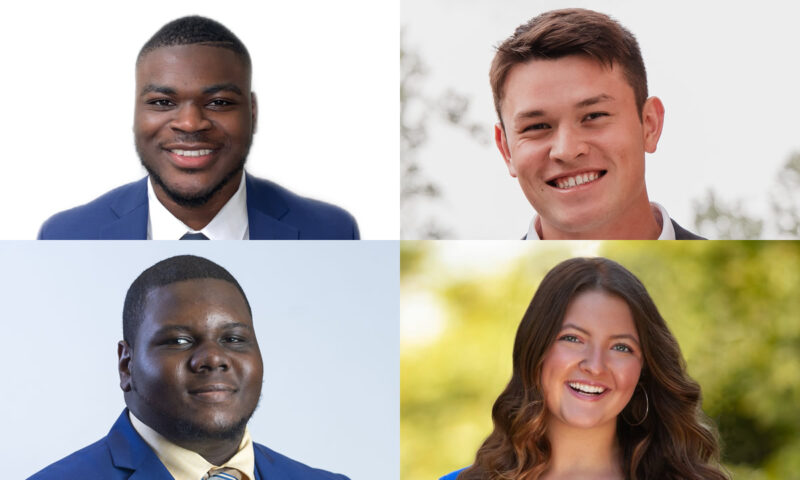Much is rightly made of McIntire’s innovative business education, but perhaps its ability to develop analytical skills and computational thinking is also due for some attention. After all, the Commerce School received STEM designations for its B.S. in Commerce, M.S. in Commerce, and M.S. in the Management of Information Technology programs earlier this year.
As these types of technical and quantitative skills are part of the fabric of the McIntire learning experience, an initiative spearheaded by McIntire IT Professor Chris Maurer and fourth-year Sarah Lau (McIntire ’19) sought to share these aspects of the School while sparking interest in STEM-related fields with a group of local children.
Coding for Kids, a two-day program created for fifth graders at Charlottesville’s Walker Upper Elementary School, gave McIntire students the opportunity to develop their mentoring skills, while helping to develop the youngsters’ STEM skills through a circuit of solar system-based, NASA-themed challenges.
Lau, who has myriad experience working with children in a variety of capacities, including a PwC-sponsored volunteer program, came up with the idea. When she approached Maurer about partnering with a nearby school, they decided to build a program that gave McIntire students the opportunity to apply their Commerce School skill set in a new environment while working directly with elementary-aged kids. Both felt passionately that the program would be beneficial for both the Charlottesville community and the McIntire students.
The results have proven them right.
“The Coding for Kids event was an overwhelming success, due in large part to the creativity and dedication of Sarah and the other McIntire student organizers,” says Maurer. “The Walker students were so excited that they did not want to leave at the end of day one and nearly ran into the room on the second day. It was inspiring to see our McIntire students mentor and motivate the fifth graders to learn more about cybersecurity, coding, and other STEM topics.”
Mission Controlled
McIntire students ran a “space mission” through the solar system, in which the children worked together in small groups to solve challenges at each planet, says Lau, describing how the structure of eight challenges functioned. “These challenges were designed to help them learn computational thinking and computer science skills, which are the basis for coding.”
Commerce School mentors led the Walker students through tasks at each planet-themed station ranging from learning how to choose strong passwords on Mercury and decoding Venus’s “alien hieroglyphic” messages, to rudimentary directional programming to drive Ozobot toys across Martian landscape mazes.
Heralded by flashing colored lights and the whirring of tiny wheels, the latter challenge was understandably quite popular.
“The toys are basically mini-robot drones that can be programmed to move around,” says Kenry Lin (McIntire ’19), who previously volunteered in a Big Brothers Big Sisters program helping struggling Monticello High School students.
“The idea was to let the students discover the best path through an iterative process to finally code the robots to clear the maze.”
Other challenges involved manipulating decoder rings to decipher messages, testing students’ memory to hop across a patchwork exercise mat of squares doubling as the moons of Uranus, and mapping constellations to determine a cryptic date.
Judging by the buzzing energy and occasional excited outburst, the fifth graders were highly engaged by their mentors throughout the sessions.
“I think that the kids were very excited about coding and code breaking by the end of the event, and most definitely understood what a strong password was,” Lau says. “I heard from a couple of the volunteers that their kids wished they could do this event every day.”
University Support and a Future Vision
To help fund the project and the requisite materials for it, Maurer approached The Jefferson Trust, a UVA Alumni Association initiative launched in 2005 to provide discretionary support for programs that encourage leadership, creativity, innovation, and enhance the student experience.
Maurer says the trust’s new “flash funding” grant program was instrumental in supporting Coding for Kids, as it was created for situations just like this one: a pilot program happening in the near term. The learning materials were all donated to Walker after the event, and all of the fifth graders received the same type of decoder ring used in the challenge.
Lau credits Maurer with Coding for Kids’ success. “Not only has he endured countless emails from me over the past few months, but he also helped us secure a grant from The Jefferson Trust for funding, communicated with the Charlottesville City Schools STEM coordinators, and developed this fun and interactive lesson plan,” she says. “He even made the Mars diorama!”
Lin says that in addition to mapping out the logistics behind each of the activities, Maurer prepped the mentors to be efficient and helpful instructors for the students.
“We definitely could not have made this program happen without him,” says Lau.
She also notes that Walker’s STEM teacher, Chris Chamberlin, was pleased with how the McIntire students approached the material with such a high level of detail.
Maurer says the positive sentiment was echoed by others and has the potential to influence further outreach programs between the Commerce School and Charlottesville’s elementary students. “The teachers and STEM coordinator at Charlottesville City Schools were quite impressed with how prepared our students were, and I will be meeting with them in the coming weeks to discuss how we can expand this partnership in the future.”



